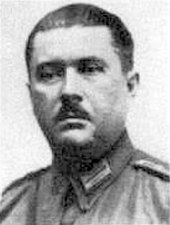Gerhard Wagner (doctor)
Gerhard Wagner (born August 18, 1888 in Neu-Heiduk , Upper Silesia , † March 25, 1939 in Munich ) was a German doctor and National Socialist. In the German Reich from 1933 to 1945 he was the first Reichsärzteführer .
Life
Gerhard Wagner was born in Neu Heiduk (today Chorzów ) in Upper Silesia as the son of Professor of Neurosurgery Wilhelm Wagner. He studied medicine in Munich and served between 1914 and 1918 as a field medical assistant at the front in the First World War . Among other things, he was awarded the Iron Cross 1st Class (EK I). Wagner was also a member of the Epp Freikorps . After the end of the war he was an assistant doctor at the Munich Women's Clinic until 1920 and then ran his own practice in Munich . At the same time he was a member of the Freikorps Oberland between 1921 and 1923 . Until 1924 Wagner was the head of the "German Association of Upper Silesia" and headed the Bavarian regional association of the united "Associations of Oberschlesier loyal to home".
On May 17, 1929, Wagner joined the NSDAP ( membership number 129.008). In the same year he was co-founder and from 1932 head of the National Socialist German Medical Association (NSDÄB). In March 1933 he became Reich Commissioner for the centralized medical associations. (On March 21, the German Medical Association and the Hartmann Association submitted to the Reich Commissioner). From August 1933 he headed the newly founded Association of Statutory Health Insurance Physicians and became a representative for public health at the staff of the Führer’s deputy . In 1934 he was appointed head of the newly established Main Office for Public Health , where he became Main Office Manager in 1935 and Main Service Provider in 1936. From 1934 onwards, Wagner was also the commissioner for university questions on Rudolf Hess ' staff , whose family doctor Wagner was, and a member of the NSDAP's university commission . In December 1935 Wagner also became head of the Reich Medical Association and in 1936 Reich Medical Leader of the NSDAP. He headed the medical services at the Nazi Party Congress and was a member of the Reich Chamber of Labor . He was also a member of the “Advisory Council on Population and Racial Policy” of the RMI , from January 1936 of the “ Reich Committee for the Protection of German Blood ” and from 1937 of the “Working Group for Health Management of the German People”.
From November 1933 until his death, Wagner was a member of the National Socialist Reichstag . In the SA , which he had been a member of since 1929, he was promoted to SA-Sanitätsobergruppenführer in 1937.
Wagner died of cancer at the age of 50. His successor as Reichsärzteführer was the Berlin City Medical Councilor Leonardo Conti .
Gerhard Wagner was jointly responsible for the Nazi murders and forced sterilization of Jews and the disabled and showed himself at the Nuremberg Party Congress of 1935 as a staunch supporter of the Nuremberg Laws and thus the racial legislation and racial policy of the National Socialists.
literature
- Michael Grüttner : Biographical Lexicon on National Socialist Science Policy (= Studies on Science and University History. Volume 6). Synchron, Heidelberg 2004, ISBN 3-935025-68-8 , p. 179.
- Ernst Klee : Das Personenlexikon zum Third Reich , Fischer Taschenbuchverlag, Frankfurt am Main 2005, ISBN 3-596-16048-0 .
- Hans-Peter Kröner: Wagner, Gerhard. In: Werner E. Gerabek , Bernhard D. Haage, Gundolf Keil , Wolfgang Wegner (eds.): Enzyklopädie Medizingeschichte. De Gruyter, Berlin / New York 2005, ISBN 3-11-015714-4 , p. 1463.
- Wagner, Gerhard, Dr. med. In: Alfons Labisch / Florian Tennstedt : The way to the "Law on the Standardization of Health Care" of July 3, 1934. Lines and moments of development of the state and municipal health system in Germany , Part 2, Academy for Public Health in Düsseldorf 1985, ISSN 0172 -2131, pp. 508-509.
- Joachim Lilla , Martin Döring, Andreas Schulz: extras in uniform: the members of the Reichstag 1933–1945. A biographical manual. Including the Volkish and National Socialist members of the Reichstag from May 1924 . Droste, Düsseldorf 2004, ISBN 3-7700-5254-4 , p. 699 f .
- Robert Wistrich : Who was who in the Third Reich ?, Fischer Taschenbuch Verlag, Frankfurt am Main, 1987 ISBN 3-596-24373-4 .
- Ernst B. Zunke: The first Reichsärzteführer Dr. med. Gerhard Wagner. Medical dissertation, University of Kiel 1972.
Web links
- Gerhard Wagner in the database of members of the Reichstag
- Newspaper article about Gerhard Wagner in the 20th century press kit of the ZBW - Leibniz Information Center for Economics .
Individual evidence
- ^ Ernst Klee : German Medicine in the Third Reich. Careers before and after 1945. S. Fischer, Frankfurt am Main 2001, ISBN 3-10-039310-4 , p. 48.
- ^ Ernst Klee : German Medicine in the Third Reich. Careers before and after 1945. S. Fischer, Frankfurt am Main 2001, ISBN 3-10-039310-4 , p. 43.
- ^ Alfons Labisch , Florian Tennstedt : Public Health Office or Public Health Office? On the development of the public health service since 1933. In: Norbert Frei (Hrsg.): Medicine and health policy in the Nazi era. R. Oldenbourg Verlag, Munich 1991 (= writings of the quarterly books for contemporary history. Special issue), ISBN 3-486-64534-X , pp. 35–66, here: p. 43.
- ^ Ernst Klee : German Medicine in the Third Reich. Careers before and after 1945. S. Fischer, Frankfurt am Main 2001, ISBN 3-10-039310-4 , p. 48.
| personal data | |
|---|---|
| SURNAME | Wagner, Gerhard |
| BRIEF DESCRIPTION | German politician (NSDAP), MdR, Reichsärzteführer |
| DATE OF BIRTH | August 18, 1888 |
| PLACE OF BIRTH | Neu-Heiduk , Upper Silesia |
| DATE OF DEATH | March 25, 1939 |
| Place of death | Munich |
